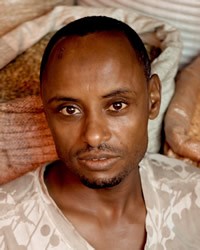Oromo, Southern in Somalia

Photo Source:
Copyrighted © 2026
Sarine Arslanian - Shutterstock All rights reserved. Used with permission |
Send Joshua Project a map of this people group.
|
| People Name: | Oromo, Southern |
| Country: | Somalia |
| 10/40 Window: | Yes |
| Population: | 109,000 |
| World Population: | 109,000 |
| Primary Language: | Oromo, Borana-Arsi-Guji |
| Primary Religion: | Islam |
| Christian Adherents: | 2.00 % |
| Evangelicals: | 0.30 % |
| Scripture: | Complete Bible |
| Ministry Resources: | Yes |
| Jesus Film: | Yes |
| Audio Recordings: | Yes |
| People Cluster: | Oromo |
| Affinity Bloc: | Horn of Africa Peoples |
| Progress Level: |
|
Introduction / History
The various Oromo people groups are the largest, most widely dispersed groups in Ethiopia. They also reside in Kenya, Somalia and Egypt. Composed of approximately a dozen tribal clusters, these peoples prefer just the term "Oromo" when speaking of themselves. Nearly all of these peoples speak mutually intelligible dialects of a language called "Oromo, Borana-Arsi-Guji". Although they retain similarities in their descent system, they differ considerably in religion, lifestyle, and political organization.
It is believed that the Oromo were pushed westward from the Horn of Africa by the Somali during the tenth century. Together with the Amhara and the Tigrai, they dominated the government and military classes of the Ethiopian Empire. In the 1700s and 1800s, these peoples became a prominent force in Abyssinian (Ethiopian) politics. During the nineteenth century, they converted to Islam.
The Southern Oromo people speak the Borana-Arsi-Guji dialect of Oromo.
What Are Their Lives Like?
The Oromo are herdsmen with a warrior tradition. They determine a man's status by the number of livestock he owns. Virility and male attributes are considered desirable, with bravery and war skills being stressed. Riding, spear throwing, and fighting are also emphasized. Although warfare against enemies is honored, peace within the group is demanded.
The Oromo live in rural areas where they make a living primarily from raising animals along with some farming. The typical dwelling is a tukal, or a circular hut made of acacia branches covered with grass mats. The cone-shaped roof has an opening that allows smoke to escape. Villages are made up of 10-80 families. Their staple diet includes durra (a cereal grain), maize, beans, rice, milk, meat, and wild fruits. Coffee and tea are both popular beverages.
The Oromo family is headed by an authoritarian father who has the right to expect total obedience. Men usually have only one wife, and children are considered a necessity. The more children and grandchildren a man has, the greater his prestige.
Oromo boys are taught to use a spear and begin training at an early age to become warriors. The killing of a man was customarily a part of becoming a full-fledged adult, as well as part of certain festivals. In fact, traditionally, a man ready to marry was expected to present part of a man who he had killed to his bride. Wild animals are now used instead of humans.
One basic value of the Oromo is tokuma, which is identification with the group. The religious, social, political and economic life of the Oromo revolves around this. Cooperation is central to this system, especially in work arrangements.
Oromo have a reputation for being easygoing and sociable. They value hospitality and almsgiving, especially to relatives and friends.
Some Oromo have moved to the towns, attracted by employment opportunities and modern schooling. Others have entered national security forces, the industrial labor force, or fields of trade, transportation, and education.
What Are Their Beliefs?
The majority of the Oromo are Muslim; however, their traditional religion is still practiced by a minority of the population. In Somalia, there are some Christians among them as well. Ethnic religionists worship a supreme being named Waqa. Wadaja feasts are organized on various occasions, and livestock is sacrificed in Waqa's honor. Today, these feasts reflect a Muslim influence.
Many people still believe that objects such as trees, springs, and rocks have spirits. It is also believed that spirits called jinn may take possession of people. While fasting during Ramadan (the Muslim holy month) is observed by most adults, celebration of other Muslim festivals is limited.
What Are Their Needs?
There are some Christians among them in Somalia, and they have a complete Bible in their Borana-Arsi-Guji dialect. However, this version uses a different alphabet than the one currently being taught.
Southern Oromo villages usually have no electricity. Medical care is poor, and access to medicine is limited. Their water supply comes from rivers and springs.
Today, there is a great need for Christian workers among the Southern Oromo. Also, leadership training and discipleship of new believers is critical if growth is to continue and new churches are to be planted.
Prayer Points
Ask God to anoint the gospel as it goes forth via radio in their area.
Pray for them to obtain the Bible in their language and read it as families.
Pray that God will give Southern Oromo believers boldness to share Christ with their own people.
Pray for the Lord to give dreams and visions of the risen Christ to Southern Oromo family leaders.
Pray for the Lord to give a great harvest to their crops as a testimony of his power and goodness.